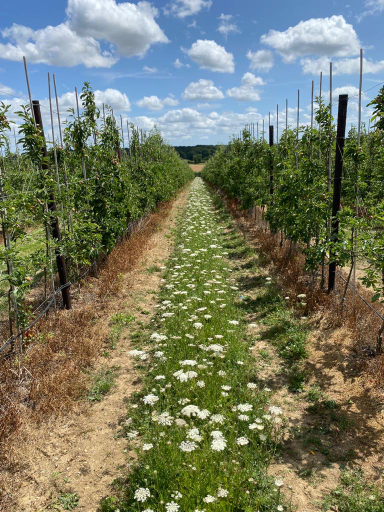On-farm trials provide growers with new treatments to manage apple canker disease

A two-year trial looking into new apple canker disease management strategies has revealed practical steps growers can take to reduce tree mortality and trunk cankers in newly planted orchards by 50%.
The project, an industry collaboration between Niab, Avalon Fresh and Agrovista, funded by Growing Kent & Medway, set out to find new approaches to manage apple canker and tree stress due to drought and waterlogging.
Canker is a tree disease that can infect the trunks of young apple trees causing tree death, which results in significant financial losses to growers. The trials looked at a range of options, from adding beneficial microorganisms to the soils and using bio-controls to tackle the effects of canker.
Applying beneficial fungi
The results show that adding a combination of mycorrhizal fungi and a biocontrol organism called Trichoderma to the soils when the orchard is planted can drastically reduce the number of trees dying within the first two years. Mycorrhiza and Trichoderma are beneficial fungi that help trees take up more water and nutrients through their roots and become more resilient to stresses caused by weather, pests and diseases.
Notably, the results showed that when there was a lot of canker present in the orchards and trees were stressed, the treatments had a greater impact on preventing tree mortality. There were no negative impacts on fruit yields with any of the treatments used.
Alex Radu, Technical Manager for Agrovista, said: “We’ve long felt that the interaction between mycorrhizal and Trichoderma fungi could be beneficial in helping fruit trees respond to canker, but haven’t had the evidence to prove this until now. The fact that these trials have taken place on several commercial sites will give significant confidence to growers on the credibility of these results.”
Dr Matevz Papp-Rupar, Niab, said: “The trials show that the mycorrhizal fungi amendments won’t control the canker, but they can make the trees more resilient to the effects of the disease, significantly increasing their ability to survive and mature.
“We therefore recommend growers continue with a robust management programme, including good orchard hygiene removing all canker lesions, to keep the presence of disease to a low level on their sites. The soil amendments won’t stop the infection, but we have shown they can help with survival rates.”
Protecting established orchards
The mycorrhizal fungi interact with the trees’ roots in the ground. And while it is easy to add these organisms to the soil when planting new trees, there is no tried and tested way to add the beneficial organisms into existing orchards. The research team also looked at different ways to incorporate the amendments into mature, established orchards.
They used two methods: planting wildflower strips in alleyways with and without additional mycorrhiza and adding it directly to the soil when the roots are pruned, using a modified root pruner. Root pruning is done regularly in commercial orchards to stop the trees from growing too tall, so they can put more energy into producing fruit.

AMF were incorporated to tree roots using a modified pruner with an applicator developed by Agrovista
The idea was that the wildflowers are far better at association with beneficial mycorrhizal fungi than grass. They should therefore boost naturally present mycorrhizae and enable better establishment of added strains. The hope is that the increased orchard mycorrhizae network will in turn increase resilience or apple trees to canker and stress.
The research found that both methods significantly increased the presence of mycorrhiza in the orchards. And while tree root pruning and wildflowers can curtail tree growth and reduce fruit yields, the results showed that the addition of the mycorrhizal fungi offset these reductions. There was a notable increase in the sweetness in some varieties of apples tested too.
The wildflowers with added mycorrhiza could help bring biodiversity to orchards both above and below ground, boosting numbers of pollinators, beneficial insects and important microbiomes in the soils.
Nigel Jenner, Chief Technical Officer for Avalon Fresh, who led the project said: “The project has yielded successful results, providing valuable insights and practical solutions for fruit growers.”
Dr Louisa Robinson Boyer, Niab, said: “This project has been devised and developed based on the questions we are asked most frequently by growers and the industry. One of the biggest challenges we have been able to address is improving soil biodiversity and health in established orchards by incorporating the mycorrhizal fungi through wildflowers and root pruning.
“We have generated a huge volume of useful data from these trials, and it is important we continue to build on this new knowledge. We look forward to working with the industry on future research.”
The trials were undertaken on six commercial sites, and compared waterlogged and drought-prone sites, different apple varieties, soil types and management aspects. Analysis was done on the impact on the mortality, canker lesion counts and growth rate of the trees, and also on the size, number, and sweetness of the apples produced.
The project was funded through Growing Kent & Medway’s Research and Development grant, with a total project cost of £205,583. The project was led by Avalon Fresh, a fruit marketing group based in Maidstone with over 30 growers, supplying most major supermarkets.
Research
04.02.2025
